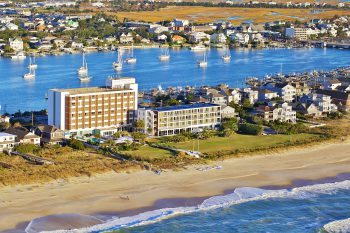WRIGHTSVILLE BEACH — Construction is now complete on a stormwater retrofit project at the Blockade Runner Beach Resort in Wrightsville Beach that is designed to redirect polluted runoff from the nearby recreational waters.

Photo by Blockade Runner Beach Resort
The resort partnered with the North Carolina Coastal Federation on the project as part of implementation of the Bradley and Hewletts Creeks Watershed Restoration Plan. The project will reduce the amount of runoff that enters Banks Channel on the soundside of the resort.
The project disconnected the two stormwater outfall pipes that drained runoff from the 2-acre resort site into Banks Channel. The outfall pipes were redirected into a series of pipes underneath the soundside lawn of the resort. This new system allows polluted runoff to infiltrate the sandy soils below. A 2,100-gallon cistern was also installed and will collect rainwater to use for irrigation, reducing the resort’s municipal water use by around 25 percent.
“We couldn’t be happier with this retrofit project,” said Feletia Lee, environmental coordinator for the resort. “Since its completion, we have seen a dramatic decrease in the amount of stormwater draining into Banks Channel, and it is exciting to know that the system is not only operational, but successful. The Blockade Runner remains committed to healthy, coastal waters that offer our guests and athletes a safe place to play and compete.”
Banks Channel is heavily used each year by thousands of swimmers, paddleboarders, sailors and kayakers. The resort hosts many recreational events each year, including the West Marine Carolina Cup, which is the world’s largest gathering of professional and amateur stand up paddleboard athletes. This year’s Carolina Cup will be held April 19-23, 2017. This year, event proceeds will benefit the federation’s efforts to protect and restore local waters.
“This significant reduction in the volume of stormwater that enters Banks Channel from the existing outfall pipes is a great win for cleaning up our waters around Wrightsville Beach,” said Tracy Skrabal, coastal scientist for the federation’s Wrightsville Beach office.
The project was made possible with funding from the North Carolina Attorney General’s Environmental Enhancement Grant Program.
To learn more, or if members of the media would like to schedule a tour of the project, please contact Jessica Gray at jessicag@nccoast.org or 910-509-2838.
